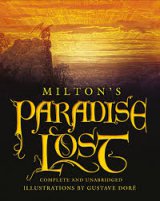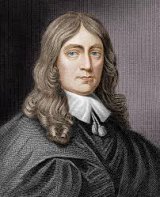Paradise Lost Page #14
Paradise Lost is an epic poem in blank verse by the 17th-century English poet John Milton. The first version, published in 1667, consisted of ten books with over ten thousand lines of verse. A second edition followed in 1674, arranged into twelve books with minor revisions throughout and a note on the versification.
His words here ended, but his meek aspect Silent yet spake, and breath’d immortal love To mortal men, above which only shon Filial obedience: as a sacrifice Glad to be offer’d, he attends the will Of his great Father. Admiration seis’d All Heav’n, what this might mean, & whither tend Wondring; but soon th’ Almighty thus reply’d: O thou in Heav’n and Earth the only peace Found out for mankind under wrauth, O thou My sole complacence! well thou know’st how dear, To me are all my works, nor Man the least Though last created, that for him I spare Thee from my bosom and right hand, to save, By loosing thee a while, the whole Race lost. Thou therefore whom thou only canst redeeme, Thir Nature also to thy Nature joyne; And be thy self Man among men on Earth, Made flesh, when time shall be, of Virgin seed, By wondrous birth: Be thou in Adams room The Head of all mankind, though Adams Son. As in him perish all men, so in thee As from a second root shall be restor’d, As many as are restor’d, without thee none. His crime makes guiltie all his Sons, thy merit Imputed shall absolve them who renounce Thir own both righteous and unrighteous deeds, And live in thee transplanted, and from thee Receive new life. So Man, as is most just, Shall satisfie for Man, be judg’d and die, And dying rise, and rising with him raise His Brethren, ransomd with his own dear life. So Heav’nly love shal outdoo Hellish hate, Giving to death, and dying to redeeme, So dearly to redeem what Hellish hate So easily destroy’d, and still destroyes In those who, when they may, accept not grace. Nor shalt thou by descending to assume Mans Nature, less’n or degrade thine owne. Because thou hast, though Thron’d in highest bliss Equal to God, and equally enjoying God-like fruition, quitted all to save A World from utter loss, and hast been found By Merit more then Birthright Son of God, Found worthiest to be so by being Good, Farr more then Great or High; because in thee Love hath abounded more then Glory abounds, Therefore thy Humiliation shall exalt With thee thy Manhood also to this Throne; Here shalt thou sit incarnate, here shalt Reigne Both God and Man, Son both of God and Man, Anointed universal King; all Power I give thee, reign for ever, and assume Thy Merits; under thee as Head Supream Thrones, Princedoms, Powers, Dominions I reduce: All knees to thee shall bow, of them that bide In Heaven, or Earth, or under Earth in Hell; When thou attended gloriously from Heav’n Shalt in the Skie appeer, and from thee send The summoning Arch-Angels to proclaime Thy dread Tribunal: forthwith from all Windes The living, and forthwith the cited dead Of all past Ages to the general Doom Shall hast’n, such a peal shall rouse thir sleep. Then all thy Saints assembl’d, thou shalt judge Bad men and Angels, they arraignd shall sink Beneath thy Sentence; Hell, her numbers full, Thenceforth shall be for ever shut. Mean while The World shall burn, and from her ashes spring New Heav’n and Earth, wherein the just shall dwell And after all thir tribulations long See golden days, fruitful of golden deeds, With Joy and Love triumphing, and fair Truth. Then thou thy regal Scepter shalt lay by, For regal Scepter then no more shall need, God shall be All in All. But all ye Gods, Adore him, who to compass all this dies, Adore the Son, and honour him as mee. No sooner had th’ Almighty ceas’t, but all The multitude of Angels with a shout Loud as from numbers without number, sweet As from blest voices, uttering joy, Heav’n rung With Jubilee, and loud Hosanna’s fill’d Th’ eternal Regions: lowly reverent Towards either Throne they bow, & to the ground With solemn adoration down they cast Thir Crowns inwove with Amarant and Gold, Immortal Amarant, a Flour which once In Paradise, fast by the Tree of Life Began to bloom, but soon for mans offence To Heav’n remov’d where first it grew, there grows, And flours aloft shading the Fount of Life, And where the river of Bliss through midst of Heavn Rowls o’re Elisian Flours her Amber stream; With these that never fade the Spirits Elect Bind thir resplendent locks inwreath’d with beams, Now in loose Garlands thick thrown off, the bright Pavement that like a Sea of Jasper shon Impurpl’d with Celestial Roses smil’d. Then Crown’d again thir gold’n Harps they took, Harps ever tun’d, that glittering by their side Like Quivers hung, and with Praeamble sweet Of charming symphonie they introduce Thir sacred Song, and waken raptures high; No voice exempt, no voice but well could joine Melodious part, such concord is in Heav’n. Thee Father first they sung Omnipotent, Immutable, Immortal, Infinite, Eternal King; thee Author of all being, Fountain of Light, thy self invisible Amidst the glorious brightness where thou sit’st Thron’d inaccessible, but when thou shad’st The full blaze of thy beams, and through a cloud Drawn round about thee like a radiant Shrine, Dark with excessive bright thy skirts appeer, Yet dazle Heav’n, that brightest Seraphim Approach not, but with both wings veil thir eyes. Thee next they sang of all Creation first, Begotten Son, Divine Similitude, In whose conspicuous count’nance, without cloud Made visible, th’ Almighty Father shines, Whom else no Creature can behold; on thee Impresst the effulgence of his Glorie abides, Transfus’d on thee his ample Spirit rests. Hee Heav’n of Heavens and all the Powers therein By thee created, and by thee threw down Th’ aspiring Dominations: thou that day Thy Fathers dreadful Thunder didst not spare, Nor stop thy flaming Chariot wheels, that shook Heav’ns everlasting Frame, while o’re the necks Thou drov’st of warring Angels disarraid. Back from pursuit thy Powers with loud acclaime Thee only extold, Son of thy Fathers might, To execute fierce vengeance on his foes, Not so on Man; him through their malice fall’n, Father of Mercie and Grace, thou didst not doome So strictly, but much more to pitie encline: No sooner did thy dear and onely Son Perceive thee purpos’d not to doom frail Man So strictly, but much more to pitie enclin’d, He to appease thy wrauth, and end the strife Of Mercy and Justice in thy face discern’d, Regardless of the Bliss wherein hee sat Second to thee, offerd himself to die For mans offence. O unexampl’d love, Love no where to be found less then Divine! Hail Son of God, Saviour of Men, thy Name Shall be the copious matter of my Song Henceforth, and never shall my Harp thy praise Forget, nor from thy Fathers praise disjoine.
Translation
Translate and read this book in other languages:
Select another language:
- - Select -
- 简体中文 (Chinese - Simplified)
- 繁體中文 (Chinese - Traditional)
- Español (Spanish)
- Esperanto (Esperanto)
- 日本語 (Japanese)
- Português (Portuguese)
- Deutsch (German)
- العربية (Arabic)
- Français (French)
- Русский (Russian)
- ಕನ್ನಡ (Kannada)
- 한국어 (Korean)
- עברית (Hebrew)
- Gaeilge (Irish)
- Українська (Ukrainian)
- اردو (Urdu)
- Magyar (Hungarian)
- मानक हिन्दी (Hindi)
- Indonesia (Indonesian)
- Italiano (Italian)
- தமிழ் (Tamil)
- Türkçe (Turkish)
- తెలుగు (Telugu)
- ภาษาไทย (Thai)
- Tiếng Việt (Vietnamese)
- Čeština (Czech)
- Polski (Polish)
- Bahasa Indonesia (Indonesian)
- Românește (Romanian)
- Nederlands (Dutch)
- Ελληνικά (Greek)
- Latinum (Latin)
- Svenska (Swedish)
- Dansk (Danish)
- Suomi (Finnish)
- فارسی (Persian)
- ייִדיש (Yiddish)
- հայերեն (Armenian)
- Norsk (Norwegian)
- English (English)
Citation
Use the citation below to add this book to your bibliography:
Style:MLAChicagoAPA
"Paradise Lost Books." Literature.com. STANDS4 LLC, 2024. Web. 23 Nov. 2024. <https://www.literature.com/book/paradise_lost_101>.




Discuss this Paradise Lost book with the community:
Report Comment
We're doing our best to make sure our content is useful, accurate and safe.
If by any chance you spot an inappropriate comment while navigating through our website please use this form to let us know, and we'll take care of it shortly.
Attachment
You need to be logged in to favorite.
Log In